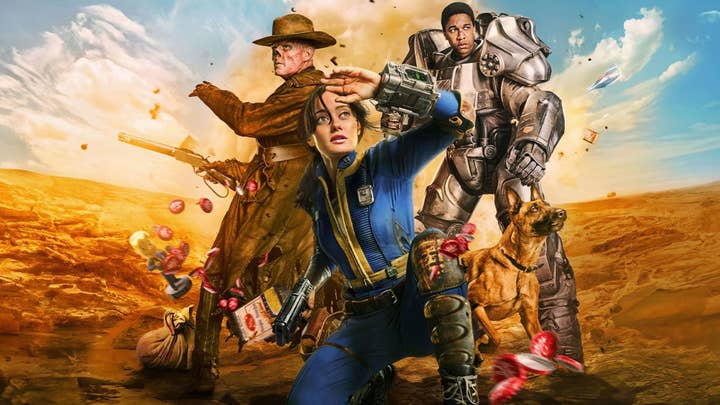Why major UK film PR agency DDA is moving into games
We talk to Gemma Cooper and Julie La'Bassiere about the convergence of film, TV, and games, and their vision for a "borderless world" between these industries
You'd be forgiven for not knowing who DDA is. The public relations firm has several decades of experience in our sister industries, but is a newcomer to games.
Founded in 1970 in London, DDA specialises in TV and film PR, employing over 150 people across its HQ and two other offices in New York and Los Angeles.
And earlier this year, the firm initiated its foray into games, hiring Media Molecule and Bandai Namco alumnus Gemma Cooper as director of gaming.
The company also recruited Julie La'Bassiere in April, as its new chief strategy officer. La'Bassiere is a BAFTA deputy chair, having previously been CEO of its New York branch. She's previously worked for the likes of Tribeca, Obscured Pictures and Apple TV in a career spanning over 25 years.
The convergence of film and games has taken a serious turn in recent years, thanks to the success of adaptation including the Mario and Sonic films, the Last of Us and Fallout TV series (the latter of which DDA handled PR for), and more. Initiatives like Amazon's upcoming anthology series Secret Level also are an exciting sign that these worlds are merging – from the creators of Love, Death & Robots, the series will adapt popular game IPs as standalones stories.
It's these increasingly open ways of communication between film, TV, and games that have led DDA to want to make a move into the industry.
"From the very beginning, way before my time, DDA was working on those film franchises which were based on games, which no one really thought about," La'Bassiere tells GamesIndustry.biz. "We think about convergence now, but convergence was around Silent Hill, and Max Payne, and Hitman, and Resident Evil, which were films that we worked on in our history. [But we were] not necessarily thinking about, 'Maybe we're going to get into games someday.' But I think it was the beginning."
As years have gone by and "that convergence has happened," La'Bassiere continues, DDA just organically ended up working on an increasing number of games-related projects.
"Our job is to make sure that we are amplifying what our clients want to audiences – we're seeing how audiences are changing. So someone who is a film aficionado and a purist of film can also be a gamer, can also watch a series like Fallout. All of those things, those silos that used to be film, television, and games… those walls are very thin, and they're not even really walls any more. They're more like curtains," she smiles.
"So, we're moving between each one. And I think [at] DDA, because we want to be in the cultural moments that are happening, we want to make sure that we're amplifying for our clients what those cultural moments are, [so] games just kind of make sense. It wasn't something that was calculated as much as it was, 'This is a natural progression of what we should be doing.'"
Since DDA didn't necessarily have games expertise in-house, this is where Cooper's role comes into play, becoming the bridge between two worlds.
"For all of our industries to grow and to expand, to be sustainable, we have to continue to support the small guys and girls"
"I've been brought in to create this gaming team that doesn't exist," she tells us. "We've got fantastic people in our team that can do social media really well, that do publicity really well, and also have contacts in key outlets that games don't necessarily always touch. You'll see big articles about Cyberpunk, FIFA, Call of Duty, these really big glossy hyped up AAA games that will always end up in the top publications, but other than that, it's hard to break in if you're not one of those multi-million pound Rockstar GTA types of games.
"So, what I would like to do and what my ambitions are with the team is to give publishers, indies, developers, or whoever graciously wants to work with us, the space of moment to move into those areas and gain the contacts that DDA have managed to achieve over 50 years."
DDA already works with clients that have games or are merging into the games space, Cooper notes, like Netflix and Disney.
"All these streaming services and clients that we already work with are naturally going into that gaming space anyway," Cooper continues. "So, we've got a two-tiered approach, I suppose, which is we've already got this really enticing set of clients that we can go in, support, and expand into other areas. But then also, we can seek out and look for new people. We can take all this expertise. And the fact that we're a 360 agency should be really appealing to people in the games space."
La'Bassiere clarifies that DDA isn't just looking at AAA names and budgets, but is also keen to get involved in the indie space, similarly to what it's doing in the film space (it's been working with the BFI and small documentary company Dogwoof, for instance).
"We would love to work with Rockstar, great, but we also want to work with the indie folks really, because in order for all of our industries to grow and to expand, to be sustainable, we have to continue to support the small guys and girls, and make sure that they're getting as much attention, especially because there's so much creativity that comes out of those indie studios."
"Those silos that used to be film, television, and games… those walls are very thin, and they're not even really walls any more. They're more like curtains"Julie La'Bassiere
We mention that DDA is entering the gaming space at a tumultuous time, to which La'Bassiere immediately replies with a grin that "obviously the film and television space have had the best time for the last ten years," hinting at the COVID crisis and the writers' strike that lasted for most of 2023.
"I mean, of course, I joke because I think that what we can come to the games industry with is… we get it," she smiles. "The [film and TV] industry is still recovering. There are lots of people who are out of work, and lots of people who don't know what they're going to do. And it is an industry that is in crisis. So I think that what we bring [an understanding] to the games industry. We know how hard it is.
"But I also think, like in film and television, there is this tremendous support for each other [in games], which I find incredible, especially when things are not great. And out of that support is this amazing creativity and strive for excellence. And I think the same thing is happening in film and TV, where… Maybe we need to think differently. Maybe we don't need to spend as much money on this. And to me, for DDA going into the games space, that's the exciting bit; not to take away any of the stuff that's not so great but, out of the stuff that's not so great, there are some really exciting possibilities."

We ask La'Bassiere what the games industry can learn from its sister industries to help overcome its current crisis.
"It may suck now, but it will get better," she says. "I know it's really hard for someone to hear someone go, 'Don't worry, it'll get better.' But it actually will, and I think you just have to get to the other side of it. Being open to possibilities, I think that that would be the lesson. I was around when things like DVDs were coming out, or the birth films on cable TV and, 'How can we watch films on television? Films are supposed to be in theatres, it's the death of the industry, people are never going to go to cinemas again!' And look where we are now… But as I said, I think that out of that darkness and that turmoil, if you're just a little bit open, there are so many possibilities, and it will get better."
Cooper mentions that off the back of the several thousands layoffs that have happened in games over the past two years, lots of indie studios have popped up.
"It's scary right now for many people, but I'm hopeful and positive that in the future, the fruits of all these incredible studios and indies popping up lead to something fantastic, especially [as] lots of AAA games have been pushed [back]. So, there are going to be more gaps in the market to fit in more indies and more launches, while we're waiting for the next Nintendo Switch or we're waiting for the next GTA."

Looking at the future, Cooper and La'Bassiere think the convergence of film, games, and TV is only going to go further and further.
"It's going to be less of a curtain, it's going to be completely seamless – and we see that in things like Vision Pro," La'Bassiere says, adding that Apple's device could change how we watch films and play games, giving the sense of a "borderless world."
"In that borderless world, there are no walls, there are no curtains. Even though [that] technology right now is accessible to very few people, it's going to iterate, just like when iPhones came out. Again, I'm old enough to remember CD players… When that stuff came out, they were really expensive, and then all of a sudden, they were nothing. So, I see the iteration of that borderless experience, and hopefully borderless also not only through film, television, and games, but borderless in terms of the world. So being able to access films and games that are made outside of the US and the UK; films that are being made in Africa, in Asia. Borderless in the true sense of the word. That's where I would like to see this convergence happen."

